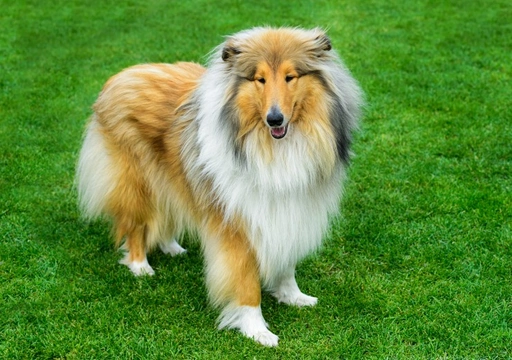
Nasal solar dermatitis (Collie Nose) in the rough collie
The rough collie is a dog breed that most of us in the UK have seen at some point, and while this is not the most common or popular of the various different collie dog breeds, these medium-sized and luxuriously coated dogs have a lot to recommend them.
The rough collie coat is of course one of their most distinctive features, and dogs of the breed need a significant amount of brushing and grooming as a result, to keep the coat in good condition and free from knots and tangles.
Rough collies are very lively and energetic dogs that needs lots of exercise and time spent playing, and they are also highly intelligent and need an equal amount of mental stimulation too. This can mean that dogs of the breed can be quite time consuming to own, but if you’re looking for a very smart and very active dog that thrives on having a job to do and that actively enjoys training, the rough collie might be the perfect pick.
When it comes to the health of dogs of the breed, rough collies tend to be hardy, robust and long lived, with an average lifespan of 14-16 years, and many individual dogs reaching significantly older. While there are not a huge number of health conditions that the rough collie is prone to, anyone considering buying or adopting a dog of the breed is advised to learn about the breed’s hereditary health and common health conditions before committing to a purchase.
Nasal solar dermatitis or “collie nose” is a canine health condition that can be found across a number of different breeds of dogs, but one of the best known of them is the rough collie. This hereditary health condition can be painful and uncomfortable for affected dogs, as well as changing their appearance, and so prospective rough collie buyers should learn a little more about the condition when researching prior to buying a pup.
In this article we will look at nasal solar dermatitis or collie nose in the rough collie in more detail, covering the symptoms, effects, and treatment and management options available. Read on to learn more.
What is nasal solar dermatitis?
Nasal solar dermatitis or “collie nose” is a hereditary health condition that is thought to be triggered by exposure to sunlight in affected dogs, and that tends to affect dogs without a lot of pigmentation on their face and nose. In affected dogs, sores and lesions develop across the nose itself, and also, often on the lips and eyelids too.
Generally, the very tip of the dog’s nose is the first place that will be affected, which can cause inflammation and swelling of the whole nose and potentially, painful ulceration of the skin. This usually spreads upwards across the bridge of the nose, and may travel as far as the eyes, causing similar symptoms on the dog’s eyelids.
The lips too many be affected, and serious nasal solar dermatitis can cause the affected areas of skin to become raw, scaly and sore, and they may weep or bleed. The condition tends to worsen in the summer when dogs are exposed to more sun, and it is more common in sunny, warm areas of the country than in cooler regions.
What sort of rough collies might develop nasal solar dermatitis?
Nasal solar dermatitis has a hereditary element to it, and so a dog who has a parent or other close relative with the condition is exponentially more likely to develop it than one with no history of the condition in their breed line.
It can affect both male and female dogs and vary in terms of its age of onset, but it tends to develop for the first time in younger dogs, and will tend to be triggered by exposure to sun. Dogs with pale noses and pink skin are those most likely to develop nasal solar dermatitis.
What are the symptoms of nasal solar dermatitis in the rough collie?
Nasal solar dermatitis in the rough collie usually presents with quite obvious symptoms, but tying them back into their root cause isn’t always simple! The symptoms of nasal solar dermatitis in the rough collie are also common to some other health conditions too, and so your vet will need to rule these out in order to reach a formal diagnosis. Some of the symptoms of nasal solar dermatitis that you might notice at home include:
- Red, sore patches developing on the nose.
- Ulcers, sores or weeping skin on the nose.
- Irritation and inflammation of the eyelids.
- Sores, redness and cracked lips.
- The development of skin lesions on the nose, eyelids of mouth.
- Tumour formation in acute, serious presentations of the condition.
Can nasal solar dermatitis be treated or cured?
Generally, your vet will prescribe a corticosteroid cream for application to the affected areas to help to promote healing and prevent further damage. Antibiotics may also be indicated if the lesions or sores have become infected.
Keeping your dog out of bright sunlight and using a high SPF factor dog-safe sun cream is also important, and being vigilant about applying it can help to prevent further pain and damage to the skin. If the sores are causing the dog a lot of pain, painkillers might be prescribed too, until the dog is on the mend.
A rough collie with nasal solar dermatitis can pass the condition on to their own offspring, and so should not be used for breeding.



